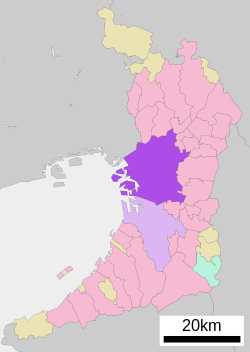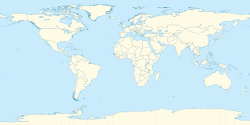Osaka
大阪市 | |
|---|---|
| Osaka City | |
From top, left to right: Osaka Castle and Osaka Business Park, Tsūtenkaku tower in Shinsekai, Dōtonbori, The Dainihongu (second sanctuary) and Sorihashi bridge of Sumiyoshi Taisha shrine, Shitennō-ji within Abeno Harukas, Midōsuji Avenue and Nakanoshima island | |
 | |
 Location of Osaka in Osaka Prefecture | |
| Coordinates: 34°41′38″N 135°30′8″E / 34.69389°N 135.50222°E | |
| Country | Japan |
| Region | Kansai |
| Prefecture | Osaka Prefecture |
| Island | Honshu |
| Government | |
| • Body | Osaka City Council |
| • Mayor | Hideyuki Yokoyama (ORA)[1] |
| Area | |
| 225.21 km2 (86.95 sq mi) | |
| [2][circular reference] | |
| Population (March 1, 2021) | |
| 2,753,862 | |
| • Rank | 3rd in Japan |
| • Density | 12,214/km2 (31,630/sq mi) |
| • Metro | 19,303,000 (2019, Keihanshin) |
| Time zone | UTC+9 (Japan Standard Time) |
| - Tree | Cherry |
| - Flower | Pansy |
| Address | Osaka City Hall: 1-3-20 Nakanoshima, Kita-ku, Osaka-shi, Osaka-fu 530-8201 |
| Phone number | 06-6208-8181 |
| Website | city |
| Osaka | |||||||
|---|---|---|---|---|---|---|---|
Ōsaka in kanji | |||||||
| Japanese name | |||||||
| Kanji |
| ||||||
| |||||||
Osaka (Japanese: 大阪市, Hepburn: Ōsaka-shi, pronounced [oːsakaɕi]; commonly just 大阪, Ōsaka [oːsaka] ) is a designated city in the Kansai region of Honshu in Japan, and one of the three major cities of Japan (Tokyo-Osaka-Nagoya). It is the capital of and most populous city in Osaka Prefecture, and the third-most populous city in Japan, following the special wards of Tokyo and Yokohama. With a population of 2.7 million in the 2020 census, it is also the largest component of the Keihanshin Metropolitan Area, which is the second-largest metropolitan area in Japan[4] and the 10th-largest urban area in the world with more than 19 million inhabitants.[3]
Ōsaka was traditionally considered Japan's economic hub. By the Kofun period (300–538) it had developed into an important regional port, and in the 7th and 8th centuries, it served briefly as the imperial capital. Osaka continued to flourish during the Edo period (1603–1867) and became known as a center of Japanese culture. Following the Meiji Restoration, Osaka greatly expanded in size and underwent rapid industrialization. In 1889, Osaka was officially established as a municipality. The construction boom accelerated population growth throughout the following decades, and by the 1900s, Osaka was the industrial hub in the Meiji and Taishō periods. Osaka made noted contributions to redevelopment, urban planning and zoning standards in the postwar period, and the city developed rapidly as one of the major financial centers in the Keihanshin Metropolitan Area.
Osaka is a major financial center of Japan, and it is recognized as one of the most multicultural and cosmopolitan cities in Japan. The city is home to the Osaka Exchange as well as the headquarters of multinational electronics corporations such as Panasonic and Sharp. Osaka is an international center of research and development and is represented by several major universities, notably Osaka University, Osaka Metropolitan University, and Kansai University. Famous landmarks in the city include Osaka Castle, Osaka Aquarium Kaiyukan, Dōtonbori, Tsūtenkaku in Shinsekai, Tennōji Park, Abeno Harukas, Sumiyoshi Taisha Grand Shrine, and Shitennō-ji, one of the oldest Buddhist temples in Japan.
- ^ Johnston, Eric (April 8, 2019). "Osaka leaders win in elections to swap roles, but merger prospects unclear" – via Japan Times Online.
- ^ with undecided boundary, see Japanese wiki ja:大阪市
- ^ a b Cite error: The named reference
japan2was invoked but never defined (see the help page). - ^ Cite error: The named reference
stats-bojwas invoked but never defined (see the help page).













